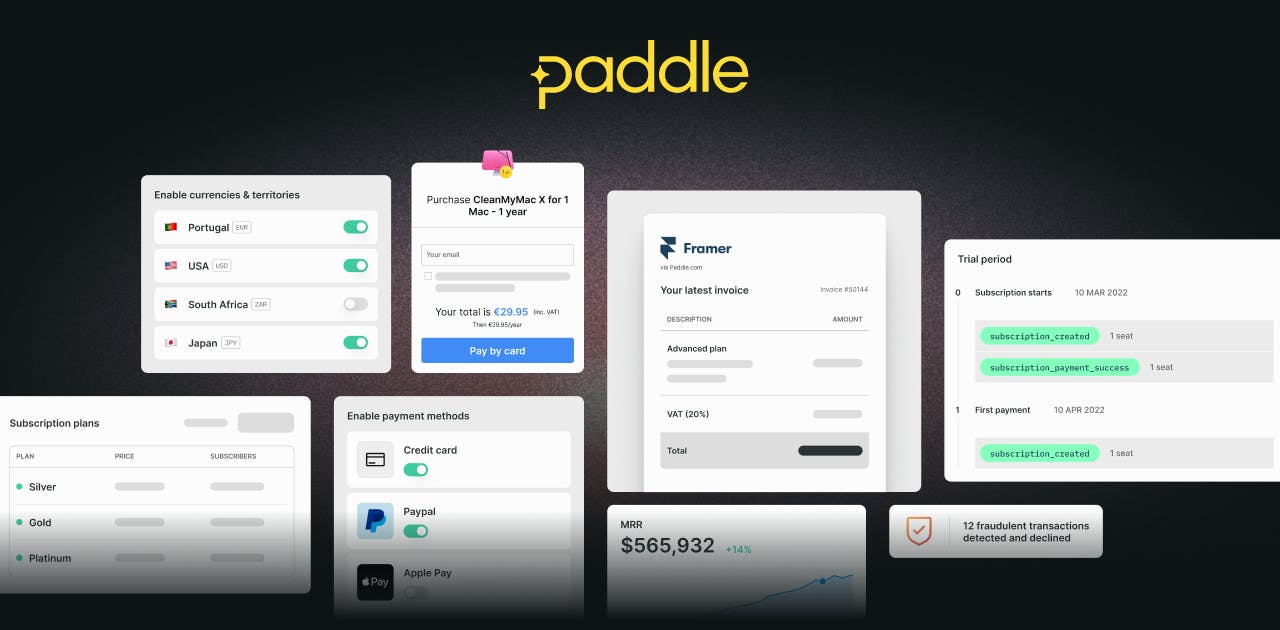Why You Shouldn’t Use Stripe for Your Next SaaS
Stripe is the go-to solution for a lot of developers — but is it the right one for you?

Stripe is the go-to solution for a lot of developers. It has a great API and is really versatile — no matter your billing structure, Stripe can handle it! It‘s also one of the more customisable solutions on the market, making it possible to integrate their checkout into your design as natively as possible.
Still, for most developers, Stripe might not be the most-suitable solution for their SaaS business. In this article, I'll go over these reasons and give you some alternatives.
1. Taxes
Stripe is simply a payment processor. It does not handle any taxes for you – it merely tells you where you have to register as a company and pay taxes based on your global revenue. In the end, you are fully responsible for all global taxes.
That means you have to concentrate less on your product as you invest more time in bookkeeping and fulfilling your tax duties. The more customers you get in more countries worldwide, the harder it is to keep up, especially as a developer.
Paddle, a Stripe alternative, has a Tax Agony Index which displays tax jurisdictions, their tax rate, chance of owing taxes, possible penalties, and overall agony.

How does Paddle know this? They're a payment processor as well, but also a Merchant of Record (MoR).
A Merchant of Record (MoR) is the entity responsible for handling payment processing, tax compliance, and legal aspects of transactions. By using an MoR, SaaS founders and developers can simplify payment procedures and ensure they meet global regulations when selling their products or services online.
As a Merchant of Record, Paddle handles global sales taxes for their clients, so they know exactly which tax jurisdictions come with the highest agony.
And that's already the solution: use a Merchant of Record for your SaaS. With a MoR you skip the global sales tax (well, at least you're not responsible for it anymore). You'll receive your revenue minus the sales tax at each payout, and you'll most likely just owe your local tax authority income tax. That simplifies global sales dramatically, which allows you to focus more on your product, not the global taxes.
2. Pricing
Stripe doesn't exactly have the clearest pricing. Depending on the services that you use with them, you may be charged extra. For example, Stripe's Fraud Detection "Radar" costs $0.05 for each verified transaction. That might not sound much now, but it can sum up quickly if you have a lot of transactions.
Again, other providers like Paddle often only charge a fixed fee (like 5% + $0.50) per transaction and include all the features in that fee, like the before mentioned fraud prevention.
As a comparison, without any extra features, Stripe charges 2.9% + $0.30. If you now add Stripe Tax into the mix, we're already at up to 7.9% + $0.80. The fee per transaction rises with every additional Stripe product you use. So that can clearly get out of hand quickly.
There are exceptions to this, like the Merchant of Record solution Lemon Squeezy which also has additional fees for certain transactions, like international transactions outside the United States.
3. Alternatives to Stripe
There are three major alternatives to Stripe. All of them have their pros and cons, but I‘d recommend you to check them out and judge for yourself.
Merchant of Record
If you’re looking for a Merchant of Record solution (that handles global sales taxes for you) I‘d recommend checking out Paddle and Lemon Squeezy.


Payment Processor
If you‘re searching for an alternative payment processor without the MoR capabilities, maybe take a look at Mollie. It‘s a dutch startup with a bit more transparent pricing based on payment method.

There are a lot more alternatives out there, so take a look and see what fits you and your product the best!
Final thoughts
Stripe really shines with complex billing models and marketplace/platform payments and payouts. If you‘re building a different product, maybe check out the alternatives.
That‘s all! I hope you enjoyed this article, and I hope I could help you decide, what provider to use for your billing needs! Good luck with your SaaS! 🎉
The information provided in this blog article is for general informational purposes only and should not be considered as legal or tax advice. The content is not intended to replace professional advice, and readers should consult with a qualified legal or tax professional for personalized guidance regarding their specific situation. The author and publisher disclaim any liability for any actions taken or not taken based on the information presented in this article.





